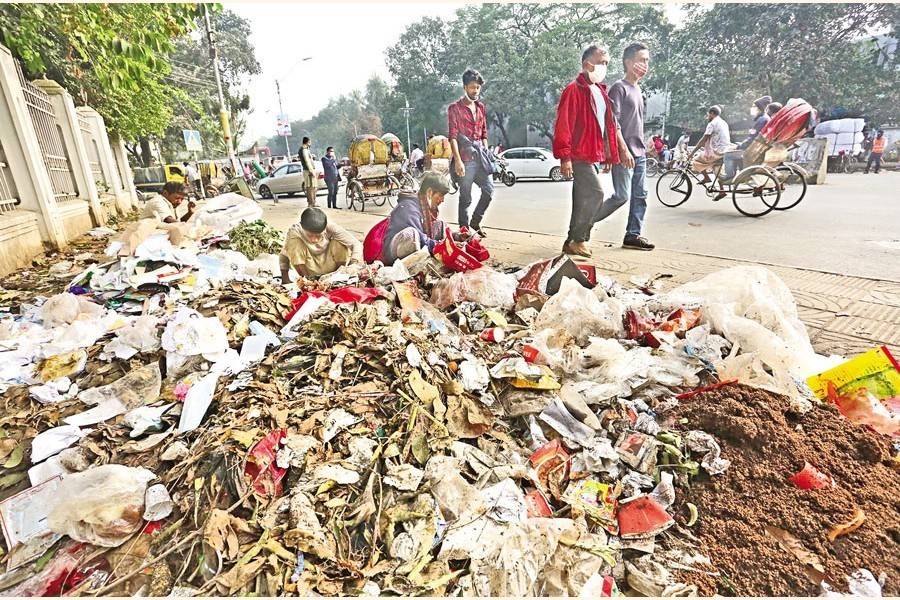Six-year-old Aswad is still too weak to join school or his fellow children in the school playground as he survived a battle for two weeks against the deadly disease dengue.
The mosquito-borne viral disease has rapidly spread this season particularly in Dhaka as an endemic, with reports of few deaths and a good number of infections coming daily.
The schoolboy, residing near Dhaka's Gulshan area, was diagnosed with dengue this late August. He was immediately taken to Gulshan Maa O Shishu Clinic in Baridhara area. Five days later he was shifted to another private health facility, United Hospital, at Gulshan-2 as his condition showed no signs of improvement.
"We had to stay two weeks in two private hospitals. We're concerned about our kid's health. Aswad's condition started improving days later in United Hospital under the careful watch of physicians. It cost over Tk 120,000," his mother told the FE correspondent about the ordeals.
At least 45 people died of dengue while over 11,000 had to be hospitalized between January and September 18 this year, by DGHS count.
However, the story of fear or sufferings of families like Aswad's or others in the capital city may not be over all too soon as mosquito menace has become a round-the-year phenomenon.
Experts and officials say open waste dumping, faulty drainage and the grabbing of water bodies and shrinking wetlands as well as changing weather patterns amid global climate change are root causes behind the rising threat of Aedes and Culex mosquitoes.
The city corporations -- Dhaka North City Corporation and Dhaka South City Corporation -- together collect about 7,500 metric tonnes of waste a day -- raising questions of how environmentally the wastes are treated or managed and dumped.
A firsthand account of the cleaning situation says garbage lies littered in some places while stinking piles are found on a number of spots under the city's flyovers.
Meanwhile, Dhaka had lost 23 per cent of wetlands in a decade to 2019, according to a report of Transparency International, Bangladesh.
Experts say every year 2.0 per cent of Dhaka's wetlands are occupied illegally -- and unsafe waste management is a major concern behind this destruction.
Prof Ahmad Kamruzzaman Majumder, teacher at the department of Environmental Science, Stamford University, attributed the increasing and uncontrolled number of mosquitoes in Dhaka to open waste dumping.
There are four phases of waste management -- waste to energy, sanitary landfill, landfill, and open dumping.
The only sanitary landfill of Dhaka, situated in Matuail, had already expired about a decade ago. The country largely depends on open dumping as there are over 1,000 open dumping grounds across Bangladesh, including in Dhaka, says Prof Majumder.
"Such open waste dumping causes environment-and dust pollution and leaks of toxic liquid and organic matter. Even during the dry season these dumping areas create an environment for mosquito breeding," he explains.
The global-climate effect raises temperatures which also help the breeding environment for mosquitoes.
"The changing weather also reduced the breeding cycle -- period between dengue larvae and mature mosquitoes -- to 8-9 days from 14 days. So, mosquitoes now can breed and multiply the number in a shorter time," Prof Majumder told the FE.
City's water bodies, including rivers, lakes, canals and inland waterways or wetlands, are filled up with city and industrial wastes, disrupting normal water flows.
Six rivers -- Buriganga, Sitalakhya, Bangshi, Turag, Balu and Dhaleshawri -- which flow around Dhaka have now become "biologically dead rivers", according to a study by Environment and Social Development Organization (ESDO).
Meanwhile, 6,000 tonnes of liquid waste are dumped into the main Buriganga River every day, the ESDO study says.
Entomologist Prof Kabirul Bashar, also a mosquito researcher and teacher at Jahangirnagar University, told the FE that such waste dumped into water bodies develops organic matters in the water which are food for mosquitoes and mosquito larvae.
"In rainy season we see a pouring threat of dengue while in the dry season we face an attack of thousands of culex mosquitoes in the city mainly due to the poor waste management and grabbing of the water bodies," he adds.
"We will have to ensure livable conditions for fishes, microbes, flora and fauna in water bodies to sustain ecological balance. It is also crucial to removing mosquitoes as a permanent measure," Prof Bashar says.
`He suggests a proper waste-collection, management-and disposal system and reclaiming the occupied water bodies and wetlands. He believes it can improve the situation and kill 80 per cent of the mosquito population in Dhaka.
Random plastic packets, bottles, and single-use plastic are found in the streets in Dhaka that finally reach water bodies and Dhaka's rivers besides disrupting the drainage system, both experts said.
Dhaka North City Corporation (DNCC) Chief Executive Officer Silem Reza says they have started reclaiming the city water bodies following government decision to hand over Dhaka city canals to the city corporation.
"We have started cleaning and watering those water bodies to return to normal water flow," he adds.
The official lamented that, being a single authority, DNCC could not change the prevailing challenging environment in Dhaka.
"We used drones to examine some 40,000-45,000 households in Dhaka this year. If the rooftop or rooftop gardens show any sign of environment for mosquito breeding. It is a huge task."


